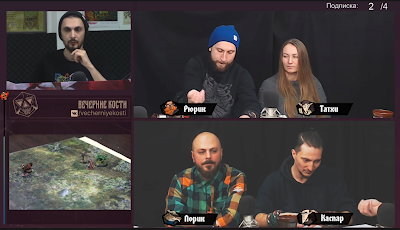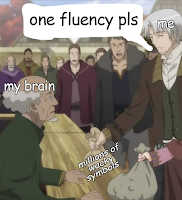Learning Russian with Immersion Methods: 12 Months Update
Hi! I’m Attenius, a native English speaker from the US learning Russian. I switched to immersion methods around early in July 2020, and it's been almost a year! I'm roughly following the plans and advice given at https://refold.la. If you're not familiar with me or Refold, you might want to check out my 6 months update and 9 months update. For those who aren't familiar with Refold but don't want to read the old posts, I've copied a summary below.
To those language learners coming to this post from outside the immersion learning community, I also want to say that I'm not really here to defend Krashen or Refold as word of God, but I think their ideas have been very useful for my goals. I definitely don't think you need to be putting in as many hours a week as me to make good progress with immersion learning, and I don't think you need immersion learning to be able to use a language to travel or communicate basic ideas. I'm just past school age and without many family or social obligations, and this is how I like to spend my time outside of work.
Refold
About a month into my pandemic studies, I kept seeing Matt vs. Japan
in my YouTube recommendations while watching Russian With Max's videos.
“Who’s this self-important weeb who thinks he knows so much about language
learning?” was a frequent thought I had. After watching a few of his
videos, I found that a lot of his points made sense, and I began to
follow Refold, a guide to learning languages through consuming media which Matt co-founded.
You can read more on the Refold website at https://refold.la, but two core assumptions of the methodology (based on the theories of the linguist Stephen Krashen) are:
- Subconsciously acquiring a language is different from consciously learning it—knowing the mechanics of swimming is not enough for you to be able to swim well.
- Language is acquired only through comprehensible input—reading
or listening to language that is slightly above our level. Corollary:
speaking and writing do not contribute directly to language acquisition.
The core methods of Refold are:
- Stage 1. First, learn the sounds, writing system, and basic vocabulary (500-1,500 words) of your target language (TL). Skim through some basic grammar.
- Stage 2. Immerse in the language—listen to and read as much content by native speakers of the TL as possible. Look up grammar and vocab when you feel like it. The easier the content is, the more comprehensible input there will be to learn from, but enjoyment takes priority.
- Use Anki to supplement immersion with sentence mining—when
you find a sentence in your immersion with only one unknown word or
grammar concept, make a card for it with the text or audio on the front
and a (preferably TL) definition of the unknown word on the back. This helps keep your memory of that word or concept alive long enough for you to acquire it in your immersion.
- Stage 3. Once you have almost perfect comprehension of a particular domain of content (e.g. slice-of-live TV shows), work on outputting (writing and speaking) by immersing in everyday conversation and choosing a parent.
Write small amounts each week and immerse in your parent’s content until you can understand them with
ease, then copy their style of speaking. As you output, you'll notice
gaps in your knowledge to target with further immersion.
- Stage 4. Once you’re comfortable outputting, master other domains.
Where I'm at
I recently watched an interview with Putin, a two-person hour-long advice podcast for tabletop roleplaying game gamemasters, and an introductory lecture to Mongolian and missed probably fewer than 10 utterances in any one of them, although it took a lot of concentration and I feel like I probably infer things more than I realize. While focusing, I can follow along with people playing Dungeons & Dragons and arguing in Among Us streams. I still absolutely suck at understanding native TV and movies, although I haven't put nearly as much time into them as I have into watching streams.
I can follow the plot of native fantasy novels written for adults, but there are still too many unknown words for me to enjoy them that much compared to translated stuff. I haven't tried reading nonfiction. I can understand written conversations between Russian-speakers fairly well, but still have to look up a lot of references and slang.
I recently decided to tentatively put myself in Refold Stage 3 (see level up; to be clear, I don't consider my home domain to be "slice-of-life TV shows"). By the description of the levels in the simplified guide, I think I have had level 5 comprehension in enough long-form videos (we'll say in the domain of "gaming") to consider myself ready. I feel somewhat confused about my position because the descriptions of level 5 in the detailed and simplified versions of the guide don't seem to align to me, but I started gravitating towards most of the 3A activities anyway just by following my interests. I hope for more clarity with whatever new comprehension scale comes out in the future, as I think the team was considering redoing it.
I don't actually find myself that concerned about getting to speaking quickly as I was before, so I'm okay with taking a long time to find and immerse with a language parent and not really going out of my way to output outside of occasionally interacting in streams and comment sections, just continuing to enjoy novels and streams for their own sake.
Totaling up the numbers
Here are my summary stats for January through June.
Sum/Mean, in hours except for total time spent in Anki and cards made. The "Total" at the bottom is Reading + Listening + 0.33 * Passive + Anki + 0.75 * Cards [with the actual input numbers in minutes].
I'll give an extremely rough estimate for how much time I spent on Russian before I started tracking.
I had 2 semesters of Russian classes several years ago: 200-300 hours
I had several years of occasional Duolingo/Pimsleur usage and about 6 weeks of learner's podcasts and flashcards before finding Matt 's channel: 100-200 hours
I didn't track my time last year, but I would put my daily average around 3-4.5 hours: 500-800 hours
This puts my total study time around 1,900-2,400 hours.
I think some learners are going to see this number and find it daunting, but I want to emphasize a couple things here. Firstly, these hours are nowhere close to equal in value.
- Time spent in the classroom was often poorly spent. It's just not that beneficial to hear other beginners choke out very basic vocabulary for most of an hour five days a week (especially if you were as sleep deprived as I was in college). After those two semesters I knew only a few hundred words and hadn't even really been taught what the soft sign ь or hard sign ъ actually mean, which is something that would be useful and could be learned in your first day of Russian.
- Time spent outside the classroom was often poorly spent. I remember cramming conjugation tables for various irregular verbs that I would need to be able to produce on tomorrow's test and it now just seems like a ridiculous use of time. When you immerse a lot, by definition you encounter the most frequently used (and therefore most important) word forms all the time, and the gaps only get easier to fill as you go.
- My sporadic Duolingo/Pimsleur usage was too far spread out, and the tools themselves are garbage for people that actually want to reach a high level. You repeat the same material too much, you're usually working with disconnected content that doesn't necessarily reflect how the language is actually used, and you're being asked to output things in a language when you have almost no understanding of it.
- Not all content is the perfect balance of comprehensible and compelling. I watched a lot of stuff that I really liked where I understood less than 10% of what I was hearing, but I was engaged the whole time and was trying to understand more. I watched too much stuff where I understood a lot and had a lot of potential to learn, but I was so bored that I might as well have been listening to static. Neither of these options are ideal (but my preference is definitely the former).
- Not all content is of the same richness or density. Sometimes you'll watch a streamer and they'll hardly say anything for two hours, while others never shut up. The latter will usually be more useful.
- Your focus wanes throughout the day. There's something to be said for the fact that if you put in hours closer together, you will be less likely to forget things that you've heard recently before you hear them again, but when I watch TV for 4 hours in a day, I become more and more tired and less and less engaged, to the point where I am again hearing basically static for much of the time in that fourth hour.
Secondly, almost 2,000 of those hours were spent just having fun! Watching YouTube, streams, movies, anime, and TV, reading books I enjoyed, hanging out with native speakers in Discords and stream chats, browsing social media, etc.
Stuff I've done for the last 3 months
Listening
I once again tried to focus more on slice-of-life native TV, but did a terrible job of it and eventually gave up. Glancing back through my notes, I was actually astounded by how few TV shows/movies (even anime ones) I had watched in the last 3 months compared to the previous 9. My mix has been roughly:
- ~5% Anime dubs and dubbed English movies
- ~50% Let's plays and streams
- ~5% Native TV and movies
- ~30% Other native YouTube, mostly pop history, video essays, game and anime reviews
- ~5% Audiobooks of light novels
- ~5% News
- Keep Your Hands Off Eizouken (anime dub) - the story of three high school girls who want to become animators, not a great dub but one of the most creative and fun shows I've ever seen without a lot of the usual garbage I associate with anime attached
- Spice and Wolf S2 (anime dub) - medieval fantasy romance about a traveling merchant and a wolf goddess with almost no fighting or magic involved, I've been reading the light novels and contributed to the crowdfunding campaign for the new dub by Reanimedia for this season, so I was excited about this for a long time
- Брат 2 [Brother 2] (movie) - extremely popular crime movie, very interesting but I had a hard time working out which level of irony each part of the film was intended to be understood at
- Иван Васильевич меняет профессию [Ivan Vasilevich Changes Profession] (movie) - Soviet classic comedy, was much more fun on the second watch
Reading
I got back into it in June and finished the main series of Spice & Wolf light novels. Волкодав [Wolfhound] remains my white whale, but I checked in after a few months and noticed that the difficulty had dropped enormously, and I think I could follow the plot pretty well if I really wanted to force myself through it.
It still seems more valuable and fun to focus on easy stuff; I've lost a lot of the fire that pushed me through my 60-80% comprehension of my first books now that I have so much stuff I can read at >97%. I'm considering some fantasy books that seem easier than Волкодав to mix in with my light novel translations and amateur fiction now that they seem more approachable though.
Anki
Anki started becoming a lot less fun. I create only about 5 cards a day now and usually only need to spend 5-10 minutes on reviews. I only mine from books since it's easier, even if the words aren't as useful for understanding listening content. I did have some success with the Migaku chrome add-on (which I used to make a few dozen audio cards from a couple slice-of-lifeish dramas on StarMedia which had matching subtitles) earlier on in this period.Output
Random things I've noticed
As much for future me as for anybody else reading this.- I love Russian smilies))))))
- Translating/interpreting is super hard. I watched a couple of things with my mom (who only speaks English) not that long ago and even when I understood what I heard, trying to express it in English to her (especially while continuing to listen) still seemed near impossible. By the time I've formulated a quarter of the translation, I've forgotten everything else that was said and/or lost track of what's going on.
- Throughout my journey with reading, I've worried that I've been translating in my head too much. Some other people have assured me that this would go away with time, and it seems that it has been. Even though sometimes I see a word and the English equivalent pops into my head (and this happens much less often now), I'm not even close to able to translate one-for-one all the things I'm understanding as I read. I have to actively work to re-express something in English, often at the sentence or paragraph level.
- Watching stuff with other
people is really fun, but I sometimes feel like my comprehension
drops 70% just knowing that someone's watching with me. I just can't help but think about them instead of focusing on the content. Most of my ability feels automatic, but hardly any of it feels passive.
- Audio quality, attention, and speaker style have just an insane impact. I think this might be half my trouble with TV shows. When I'm listening to a Youtuber sitting in front of a camera, speaking into a good microphone, and addressing the audience directly on my headphones, I can understand 500x what I can when I'm using my crappy TV speakers to hear a character mutter something cool and colloquial under rock music while explosions go off in the background. An extreme example, but any one of these factors can have a very significant influence on my comprehension.
- I tried playing some TTRPGs with some friends and felt that my English had degraded. Just the fact that I was trying to speak as a character seemed to keep bringing half-formed Russian phrases to mind. I find this happens as well when I try to do "cross-talk" with Russian speakers, although this is probably more to do with the fact that hearing something in Russian seems to put my brain in Russian-mode. Seems like I'll have to immerse in appropriate content in English to get my level back up)
- I watched a couple episodes of a donghua (Chinese version of anime) with the Refold Chinese server and actually found it pretty entertaining. I had some nagging fears that I might not like that much listening content in Mandarin, but this felt like it helped to alleviate them.
Plans for the future
Find a parent and watch them a lot. Read fantasy novels until I'm really good at it. Try to forget about learning Chinese for now because I refuse to suck at Russian forever.
I've set tentative goals to have reached 4.5 million words read and have listened to my language parent for 250 hours by the end of the year.Thanks
Огромное спасибо [huge thanks] to my friends and the Refold Discord server communities for chatting with me, enduring my complaints, humoring my questions, and correcting my mistakes!If you have any questions feel free to leave a comment here or hit me up in the Refold Discord.





Hi how do you get your light novels?
ReplyDeleteUsually
Deletehttps://ranobehub.org/
https://tl.rulate.ru/
https://rutracker.org/forum/index.php
Google ранобэ + the English title and you shouldn't have any problems finding most popular series. You can find fan-made audiobooks on rutracker and YouTube for some series too.